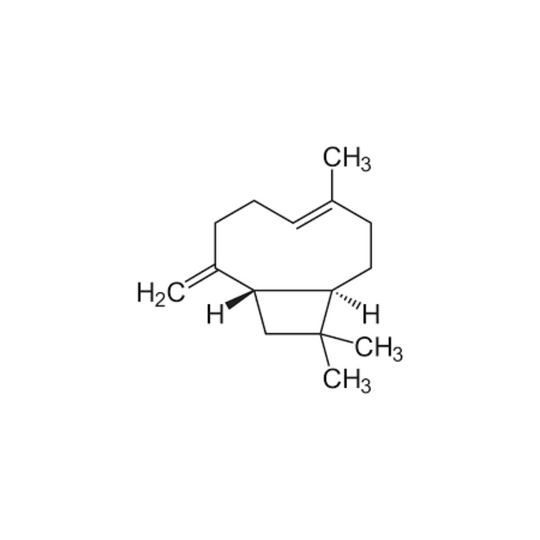Beta-Caryophyllene: A Powerful Natural Compound with Promising Benefits for Humans

Beta-Caryophyllene: A Powerful Natural Compound with Promising Benefits for Humans
Beta-caryophyllene (BCP) is a natural compound found in various essential oils, including those from black pepper, cloves, cinnamon, and cannabis. This unique terpene belongs to a class of natural compounds known as sesquiterpenes and is known for its distinctive spicy, peppery aroma. In recent years, BCP has garnered significant attention from researchers and health enthusiasts alike for its potential therapeutic benefits.
Unlike other terpenes, BCP is unique because it acts as a cannabinoid, binding directly to cannabinoid receptors in the body, specifically the CB2 receptor. This interaction opens the door to a range of potential health benefits, from anti-inflammatory and pain-relieving properties to potential neuroprotective effects. Let's delve deeper into what Beta-caryophyllene is and how it can benefit human health.
1. Anti-Inflammatory and Pain Relief Properties
One of the most notable benefits of Beta-caryophyllene is its powerful anti-inflammatory effects. By binding to CB2 receptors, which are predominantly found in peripheral tissues, BCP helps to modulate the body’s inflammatory response. This property makes it a potential therapeutic agent for conditions like arthritis, inflammatory bowel disease, and chronic pain.
Unlike traditional nonsteroidal anti-inflammatory drugs (NSAIDs), which can cause gastrointestinal issues and other side effects, BCP offers a more natural approach without these drawbacks. This makes it an attractive option for those seeking relief from inflammation and pain through natural means.
2. Potential Neuroprotective Effects
Emerging research suggests that Beta-caryophyllene may have neuroprotective properties, making it a promising candidate for treating neurodegenerative diseases like Alzheimer’s and Parkinson’s. BCP's ability to activate CB2 receptors is key here, as it can help reduce oxidative stress and inflammation in the brain, both of which are contributing factors to neurodegenerative conditions.
Furthermore, BCP has been shown to promote neurogenesis—the growth and development of new neurons—which is crucial for maintaining cognitive function as we age. Although more clinical research is needed, these findings provide hope for developing new therapeutic strategies to protect brain health.
3. Anxiety and Stress Relief
In addition to its anti-inflammatory and neuroprotective benefits, Beta-caryophyllene is also known for its anxiolytic (anxiety-reducing) properties. Studies have shown that BCP can help modulate the endocannabinoid system, which plays a critical role in regulating mood, stress response, and emotional well-being.
By interacting with CB2 receptors, BCP can help balance the body's stress response and promote relaxation without the psychoactive effects typically associated with cannabinoids like THC. This makes it a viable option for those seeking a natural way to manage anxiety and stress.
4. Supports Gut Health
Gut health is increasingly recognised as a cornerstone of overall well-being, and Beta-caryophyllene may play a role in supporting a healthy digestive system. The compound's anti-inflammatory properties can help alleviate symptoms of gastrointestinal disorders such as colitis, irritable bowel syndrome (IBS), and Crohn’s disease.
Additionally, BCP's interaction with the CB2 receptors in the gastrointestinal tract may help regulate gut motility and reduce inflammation, contributing to a healthier and more balanced digestive system.
5. Anti-Cancer Potential
Preliminary research has indicated that Beta-caryophyllene might possess anti-cancer properties. Some studies have demonstrated that BCP can induce apoptosis (programmed cell death) in cancer cells and inhibit their growth. While this research is still in its early stages and primarily conducted in laboratory settings, it provides a foundation for future studies on BCP as a complementary approach in cancer treatment.
6. Antimicrobial and Antibacterial Benefits
Beta-caryophyllene also exhibits antimicrobial and antibacterial properties. This makes it effective against various bacterial strains and fungi, which could be beneficial for topical applications in treating skin infections or wounds. The ability of BCP to fight off harmful microorganisms adds another layer of potential therapeutic use, particularly in integrative medicine and natural health practices.
7. May Promote Heart Health
Heart disease remains a leading cause of mortality worldwide, and new natural strategies for cardiovascular health are always being explored. Beta-caryophyllene's anti-inflammatory and antioxidant properties may offer protective effects against cardiovascular issues, such as atherosclerosis. By reducing oxidative stress and inflammation in blood vessels, BCP could help maintain a healthy cardiovascular system.
Conclusion
Beta-caryophyllene is a versatile natural compound with a wide range of potential health benefits. From reducing inflammation and pain to supporting brain, gut, and heart health, its therapeutic potential is vast. As more research unfolds, BCP could become an essential component of natural health practices, offering a holistic approach to well-being.
While these benefits are promising, it's essential to consult with a healthcare professional before incorporating any new supplements or essential oils containing Beta-caryophyllene into your wellness routine, especially if you have pre-existing medical conditions or are taking medications.
By harnessing the power of Beta-caryophyllene, we could unlock new pathways to health and vitality, leveraging nature's wisdom to support human well-being.
